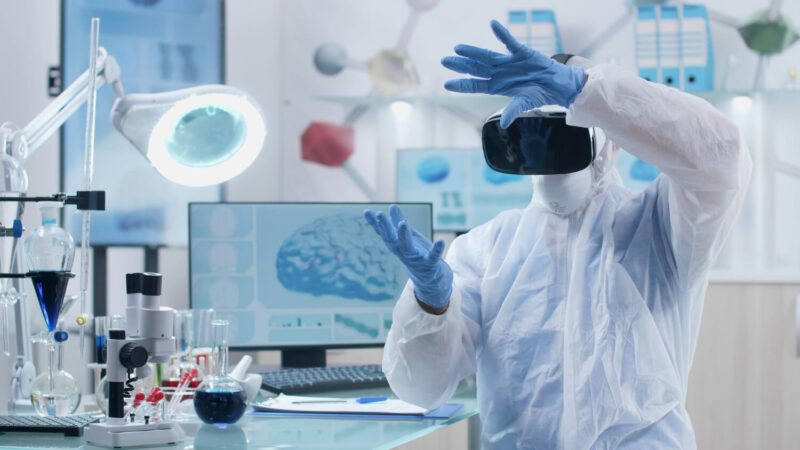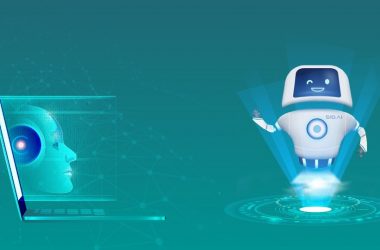Healthcare has undergone significant changes since the pandemic era. We’ve seen the adoption of minimally invasive surgery and laser therapy, along with the employment of AI healthcare solutions for various medical needs. These include treatments for conditions like tumors and specific eye issues.
Undoubtedly, health is an important aspect of everyone’s life, and AI ensures that each patient gets treatment according to their need. Further, healthcare has broadened its horizons to implement AI solutions in drug discovery as well.
AI is used to refine the structure and properties of candidate drugs to improve their effectiveness and minimize side effects. It can lead to the development of more potent and specific drugs.
In this blog, we will discuss how AI healthcare solutions are making a major impact on drug discovery process.
The Need for Drug Discovery in Healthcare
As new viruses and bacteria continue to evolve, the need for new drugs that can effectively combat them and protect our health has been emphasized. New drugs often have fewer or fewer severe side effects, making them easier for patients to tolerate and adhere to their treatment regimens.
Moreover, developing new drugs isn’t just about addressing current health threats; it’s also about preparing for future challenges. By investing in AI solutions for drug discovery now, the healthcare industry is tackling immediate concerns and building a foundation for continued innovation in healthcare.
This will further improve and enhance patient comfort and overall treatment experience. However, developing new drugs takes time and resources, which can be time-consuming and expensive for pharmaceutical companies.
Challenges in Drug Discovery Process
Despite its potential to save lives, drug discovery encounters several obstacles that impede its efficiency and success rate. Some of these hurdles are discussed below.
1. Disease complexity
One of the biggest challenges in drug discovery is the increasing complexity of diseases. Finding suitable treatments is becoming increasingly difficult with new and more complex viruses emerging.
2. High failure rate
The success rate for drugs entering clinical trials is astonishingly low, with only one in 10 drugs making it to market. This low success rate is due to a variety of factors, including toxicity issues, lack of efficacy, and unforeseen side effects.
3. Lengthy drug-making process
Developing a new drug can take 10-15 years, including preclinical and clinical trial phases. This prolonged timeline delays the availability of much-needed treatments and results in significant financial costs for pharmaceutical companies.
4. Data accessibility
Healthcare encounters a new virus every day, and the amount of disease data generated in healthcare is hard to comprehend and translate into meaningful insights for researchers.
5. Compliance requirements
Comprehending chronic and neurodegenerative diseases often poses a formidable challenge. These conditions entail navigating intricate biological processes that remain incompletely understood.
How AI Solves Drug Discovery Challenges
AI solutions are now being used to improve all aspects of the drug discovery process, from target identification and validation to clinical trial design. These technologies enable researchers to inspect vast amounts of data, identify patterns and trends, and make more accurate predictions.
It has been years, and battling diseases has been tough due to the sluggish and costly drug discovery process. Lives are lost as researchers struggle through a maze of challenges to find treatments. But now, there’s a ray of hope in AI solutions for drug discovery. They’re shaking things up, promising a quicker, more effective, and potentially life-saving path forward. Here is an overview of a few of them.
1. Finding Potential Drugs Faster
In the past, scientists had to tediously search through huge libraries of molecules, a slow and painstaking process. However, AI in pharmaceutical research now allows for rapidly analyzing vast datasets of potential drug candidates. This significantly cuts down the time needed to identify promising leads for further study.
2. Making Safer Lead Molecules
Developing a lead molecule to ensure safety involves multiple rounds of trial and error in computer simulations and laboratory experiments. Fortunately, drug discovery acceleration with AI accurately predicts how potential drugs could interact with patients.
3. Finding New Uses for Existing Drugs
Repurposing existing drugs for new applications in the past relied heavily on luck or educated guesses, leading to limited success rates. However, with drug development efficiency with AI, researchers now sift through extensive databases of published research to pinpoint drugs that may hold potential for repurposing in novel treatments.
4. Predicting Drug Safety
AI solutions for drug discovery now extend to analyzing preclinical and clinical trial data to predict the effectiveness and safety of new drug candidates. This allows researchers to prioritize top candidates and identify potential issues early, saving valuable time and resources.
5. Treatments for Individual Patients
AI healthcare solutions provide personalized treatments for each patient’s unique genetic makeup and health profile. This means that therapy plans are customized to suit individual needs, allowing for informed decisions to be made regarding their health recovery.
Examples Of AI-Enabled Drug Discovery
While the potential of AI in drug discovery is exciting, real-world success stories paint a clearer picture of its impact. Here are some captivating examples:
1. Fighting Cancer
In 2018, researchers employed a deep learning (DL) algorithm to discover new cancer treatment compounds. Trained on a massive database of existing cancer drugs, the AI solutions for drug discovery identified previously unknown molecules with promising therapeutic potential. This breakthrough highlights AI’s ability to navigate uncharted territories in drug discovery.
2. Targeting the MEK Protein
Finding effective MEK protein inhibitors, vital in cancer treatment, has posed significant challenges. Yet, researchers have recently succeeded by employing machine learning (ML) algorithms and AI healthcare solutions to discover novel inhibitors. This accomplishment underscores the remarkable potential of AI in addressing intricate biomedical hurdles.
3. Current Medications
In a collaborative effort, scientists from MIT and Harvard used AI to identify drug combinations that could improve the efficacy of existing cancer treatments. By analyzing 4,518 compounds, they found that combining two drugs could significantly reduce mouse tumor growth compared to using either drug alone.
4. Vaccine Development
During the COVID-19 pandemic, AI stepped in to help fast-track the development and distribution of vaccines. With the help of machine learning, scientists quickly sorted through vast amounts of genetic data to identify potential targets for vaccine creation. This breakthrough allowed vaccines to be developed and made available to the public much faster than usual, providing several effective options in record time.
5. New Antibiotics
The fight against antibiotic resistance received a boost from AI. Advanced machine learning techniques identified potent antibiotic candidates from a vast pool of molecules. This discovery led to a potent antibiotic effective against various drug-resistant strains, highlighting AI’s role in combating critical global health threats.
The Next Step in Drug Discovery with Artificial Intelligence
The integration of AI into drug discovery has already yielded impressive results, but the future holds even more tremendous promise. As AI technology continues to advance, we can expect to see several exciting developments:
1. Multimodal Drug Discovery
AI will facilitate multimodal drug discovery, integrating various data types like genomics, proteomics, and electronic health records. This comprehensive approach will provide a deeper understanding of diseases and lead to the development of more holistic and effective treatment strategies.
2. AI-Powered Drug Design
AI healthcare solutions will further revolutionize drug design by creating novel and optimized drug molecules. This will involve AI algorithms predicting and simulating the interaction of potential drugs with biological targets, creating medicines with superior efficacy and specificity.
3. Accelerated Drug Development
It will significantly reduce development timelines and costs by streamlining various stages of the drug discovery process. And AI solutions for drug discovery will allow for faster delivery of life-saving treatments to needy patients.
4. Democratization of Drug Discovery
AI-powered platforms can potentially democratize drug discovery by making the process more accessible to smaller research institutions and startups. This broader participation has the potential to accelerate innovation and lead to the discovery of new treatments for neglected diseases.
Conclusion
No doubt, AI Solutions for the drug discovery process and optimizing treatment regimens together represent a significant step forward in healthcare, offering a multitude of benefits for both patients and healthcare systems. By blending technological advancements with personalized medicine, we strive for better patient outcomes and a smoother healthcare system. As we continue to explore and develop in this field, the future of drug discovery and treatment optimization looks bright.
Frequently Asked Questions (FAQs)
How Does AI Contribute to Accelerating the Drug Discovery Process?
AI uses advanced algorithms to understand data gathered from large populations. It then identifies trends and patterns that can help predict the effectiveness of potential drug discovery processes for specific patient populations.
What Types of Data Does AI Utilize in Drug Discovery?
AI analyzes large data sets from preclinical studies, such as gene expression data. From this, it predicts how well lead molecules might work and how they might be used for drug discovery.
Can AI Optimize Treatment Regimens for Individual Patients?
Yes, AI quickly optimizes treatment regimens for individual patients by offering each patient treatment plans according to their needs.
What Are Some Examples of Successful AI Applications in Pharmaceutical Research?
Some examples of successful AI applications in pharmaceutical research are drug discovery, target identification, molecular design, and clinical trial optimization.
Are There Any Challenges Associated With Integrating AI Into Drug Discovery and Treatment Optimization?
Yes, challenges associated with integrating AI into drug discovery and treatment optimization include data privacy concerns, potential biases in AI algorithms, and the need for validation and regulatory approval.

Dawood is a digital marketing pro and AI/ML enthusiast. His blogs on Folio3 AI are a blend of marketing and tech brilliance. Dawood’s knack for making AI engaging for users sets his content apart, offering a unique and insightful take on the dynamic intersection of marketing and cutting-edge technology.










